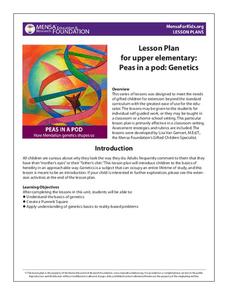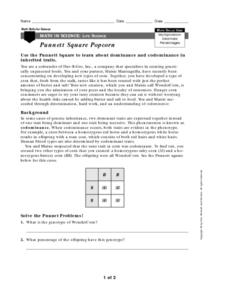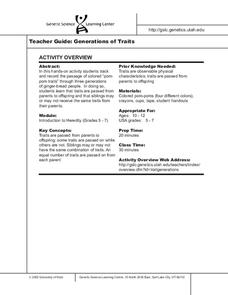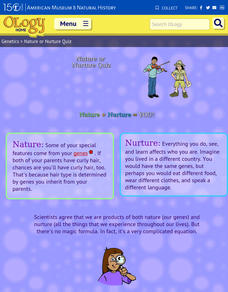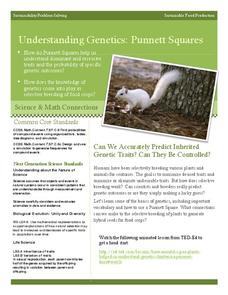MENSA Education & Research Foundation
Peas in a Pod: Genetics
Can peas have grandparents? Learn about inherited traits and heredity with a set of activities focused on Mendelian genetics. As your class learns about the process of passing traits along in Punnett squares, they take on the role of...
Biology Corner
Pipe Cleaner Babies
Ever been told you have your father's eyes? How did it happen? Young biologists get a hands-on experience in meiotic gene expression with a fun pairs-based activity. Participants use pipe cleaner chromosomes with trait beads to make...
Curated OER
Punnett Square Popcorn
In this genetics worksheet, students use the Punnett Square to learn about dominance and codominance in inherited traits. This worksheet has 1 short answer question and 6 problems to solve.
Curated OER
Incomplete Dominant and Codominant Traits Worksheet
A two-page instructional activity provides seven Punnett squares for practice in determining genotypes and phenotypes. Each is an example of incomplete dominance or codominance. After your bright biologists have mastered Punnett squares,...
Curated OER
Autosomal Pedigrees Worksheet
Three autosomal pedigrees are printed on this assignment. Biology scholars read them and determine the phenotypes for several individuals and find which ones inherit different genetic disorders. This fundamental skill can be reinforced...
Towson University
Mystery of the Crooked Cell
Can your class solve the Mystery of the Crooked Cell? Junior geneticists collaborate to learn about sickle cell anemia in a fascinating lesson plan. The included materials help them to examine the genetic factors behind the disease...
Curated OER
Generations of Traits
In this biology worksheet, students track and record the passage of colored pom pom traits through three generations of ginger-bread people. Then they describe that traits are passed from parents to offspring and that siblings may or may...
Serendip
Genetics
A handout on genetic inheritance begins with a reading on alleles and how they can result in albinism. Junior geneticists learn to complete Punnett squares and participate in a coin toss simulation of allele pairing. They also learn...
American Museum of Natural History
Nature or Nurture Quiz
Eighteen questions ask pupils whether certain behavior or trait is based on nature or nurture. Scholars take a quiz, reflect on their answers, then challenge a friend or family member to complete it.
Towson University
Mystery Disease
How did scientists determine the cause of illness before technology? Science scholars play the role of medical researcher in an engaging guided inquiry activity. Using observations, technical reading, and Punnett squares, learners...
US National Library of Medicine
Monster Genetics Lab
Harness young scientists' knowledge of genetics with an engaging science activity. Students start by flipping a coin to determine the genotypes and phenotypes of two parent monsters, before using Punnett squares to determine the...
Curated OER
Mendel Pea Plants
In this Mendelian genetics activity, students answer a variety of questions about Mendel's experiments and discoveries and they practice determining probability of outcomes in pea plants.
Western Kentucky University
Understanding Genetics: Punnett Squares
Can scientists really predict genetic outcomes or are they simply making a lucky guess? Scholars first learn about Gregor Mendel and how to make Punnett squares. Then they extract DNA from a strawberry in a lab with included conclusion...
Howard Hughes Medical Institute
Color Variation over Time in Rock Pocket Mouse Populations
A species-specific look at natural selection, the resource herein examines how adaptations have helped the population of rock pocket mice survive in a changing landscape. To begin, middle or high schoolers watch a 10.5 minute video,...
Curated OER
Adaptation Worksheet
Adaptation or acclimation? Young ecologists determine which is being exemplified in twenty questions. When teaching about adaptations, make sure to talk about acclimation, a short-term learned response to a change in the surroundings....
Curated OER
ABO Blood Types Worksheet
Blood types and transfusions are explained in reading passages at the top of the worksheet. A chart of blood type compatibility is also provided. Biology students answer comprehension questions and then exercise critical-thinking skills...
University of Georgia
Monohybrid Crosses and The Punnett Square Lesson Plan
Looking for a quick, hands-on activity to teach young scientists about Punnett squares through monohybrid crosses? then check out this one.
Curated OER
Pea Plant Punnett Square Worksheet
How often do you find a science worksheet that comes with separate teacher's instructions? Here is one of those rare instances. Goals and objectives, materials, and evaluation guidelines precede the actual assignment. Biology leaners...
Curated OER
Genetics Challenge
In this genetics worksheet, high schoolers fill in the blanks with terms related to genes, alleles, genotypes, phenotypes and heredity. They use their answers to complete a joke.
Curated OER
Human Genetic Disorder Probabilities
In this genetic disorders worksheet, students complete punnett squares for six different human genetic disorders. They predict the outcome of the offspring including the phenotypes and genotypes of each.
Other popular searches
- Inherited Learned Traits
- Inherited and Learned Traits
- Inherited vs. Learned Traits
- Inherited vs Learned Traits


